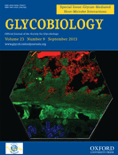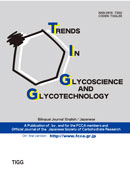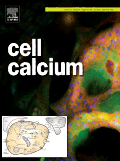
GLYCOBIOLOGY
Scope & Guideline
Pioneering Research in Glycobiology
Introduction
Aims and Scopes
- Glycan Structure and Function:
Research exploring the structural diversity of glycans and their functional implications in biological processes, including cell signaling, immune responses, and pathogen interactions. - Glycosylation Mechanisms:
Studies detailing the enzymatic processes involved in glycosylation, including the roles of glycosyltransferases and glycosidases in adding or modifying glycan structures. - Glycans in Disease Mechanisms:
Investigations into how aberrant glycosylation patterns contribute to disease pathology, including cancer, autoimmune disorders, and infectious diseases. - Therapeutic Applications of Glycans:
Research on the use of glycosylation as a target for therapeutic interventions, including drug design, vaccine development, and biomarker discovery. - Innovative Glycan Analysis Techniques:
Development and application of novel methodologies for glycan analysis, including mass spectrometry, glycan microarrays, and bioinformatics tools. - Glycan-Binding Proteins:
Studies focusing on the interactions between glycans and glycan-binding proteins (lectins, antibodies), elucidating their roles in cellular recognition and signaling.
Trending and Emerging
- Glycans in Immunotherapy:
There has been a significant increase in research focusing on the role of glycans in modulating immune responses, particularly in the context of cancer immunotherapy and vaccine development. - Glycoengineering:
Emerging studies emphasize the engineering of glycan structures for therapeutic purposes, including the design of glyco-conjugate vaccines and modified therapeutic antibodies to enhance efficacy. - Glycobiology of Infectious Diseases:
Research on the interactions between host glycans and pathogens, particularly in the context of COVID-19, has surged, reflecting the urgent need to understand these dynamics for therapeutic interventions. - Glycans in Neurological Disorders:
Increasing attention is being paid to the roles of glycans in neurodegenerative diseases and mental health disorders, with studies exploring their impact on neuronal signaling and pathology. - AI and Machine Learning in Glycomics:
The application of artificial intelligence and machine learning techniques to analyze glycan data and predict glycosylation patterns is an emerging trend, facilitating more efficient glycomic studies. - Glycan-Binding Protein Research:
Research on the discovery and characterization of novel glycan-binding proteins, including their roles in cell recognition and signaling, is on the rise, highlighting their potential therapeutic applications.
Declining or Waning
- Basic Glycan Chemistry:
Research that strictly focuses on fundamental glycan chemistry without application to biological systems has become less frequent, as the field shifts towards more applied and translational studies. - Non-Specific Glycan Interaction Studies:
Papers that explore generalized glycan interactions without specific biological contexts or applications are declining, as the emphasis has moved towards understanding specific mechanisms and implications in health and disease. - Historical Reviews and Methodologies:
The publication of historical reviews or methodological discussions, while still relevant, has decreased as the journal prioritizes original research findings and innovative studies. - Glycan Studies in Invertebrates:
Research focusing on glycans from non-mammalian species, particularly invertebrates, has seen a reduction in frequency, possibly due to a shift towards mammalian and clinical relevance.
Similar Journals

BMC Molecular and Cell Biology
Bridging knowledge gaps in the biological sciences.BMC Molecular and Cell Biology is a forward-thinking open-access journal published by BMC, specializing in the vital fields of molecular biology and cell biology. Since its inception in 2019, the journal has carved a niche for itself, ranking in the Q3 quartile in both Cell Biology and Molecular Biology categories as of 2023. With an ISSN of N/A and an E-ISSN of 2661-8850, the journal provides a platform for groundbreaking research, high-quality reviews, and innovative methodologies. Situated in the United Kingdom, BMC Molecular and Cell Biology promotes a diverse range of studies, addressing fundamental questions in biology that resonate with both experts and new researchers alike. The journal's commitment to open access ensures that valuable findings are readily available to the global scientific community, fostering collaboration and knowledge-sharing across disciplines. Researchers aiming to contribute to the field of cell and molecular biology will find this journal an indispensable resource for both publishing and staying informed on the latest advances.

TRENDS IN GLYCOSCIENCE AND GLYCOTECHNOLOGY
Fostering Collaboration in Glycoscientific EndeavorsTRENDS IN GLYCOSCIENCE AND GLYCOTECHNOLOGY, a reputable journal published by GAKUSHIN PUBL CO, serves as an essential resource for researchers and professionals engaged in the evolving fields of glycoscience and glyotechnology. Established in 1989, this journal has progressively focused on stimulating discussions and disseminating pivotal findings that impact various applications in biochemistry and organic chemistry. With an impressive converge covering decades up to 2024, the journal has carved a niche within the scientific community, despite currently being classified in the lower quartiles (Q4) for its respective categories in 2023. This designation underscores the potential for growth and enhanced visibility within research networks. While it currently operates under a subscription-based model, TRENDS IN GLYCOSCIENCE AND GLYCOTECHNOLOGY remains committed to fostering innovation and interdisciplinary collaboration, providing a critical platform for the exploration of glycan structures and functions. Located in Tokyo, Japan, the journal invites contributions that contribute to the future direction of glycoscientific research and its applications.

Innate Immunity
Empowering Researchers in the Realm of Innate ImmunityInnate Immunity, published by SAGE Publications Ltd, serves as a vital platform for disseminating cutting-edge research in the fields of immunology, microbiology, cell biology, and infectious diseases. With an ISSN of 1753-4259 and an E-ISSN of 1753-4267, this journal has been a prominent contributor to the academic community since its inception in 1996, focusing on the innate immune response and its implications for health and disease. Holding a respectable impact factor and categorized in the Q2 and Q3 quartiles across various relevant domains, Innate Immunity ranks competitively in major databases, including Scopus, where it appears in the top 75th percentile for Infectious Diseases. Researchers and professionals are encouraged to explore its wealth of articles that are pivotal in bridging fundamental immunology with clinical applications, fostering a deeper understanding of immune mechanisms vital for combating human diseases.

Doklady Biochemistry and Biophysics
Fostering Scholarly Discourse in Biochemistry and BiophysicsDoklady Biochemistry and Biophysics is a vital resource for the advancement of knowledge in the fields of biochemistry and biophysics, published by MAIK NAUKA/INTERPERIODICA/SPRINGER. Featuring an ISSN of 1607-6729 and an E-ISSN of 1608-3091, this journal plays a critical role in disseminating research findings and fostering scholarly discourse. Despite its recent ranking in the Q4 quartile for biochemistry and biophysics in 2023, it serves as an essential platform for researchers exploring these intertwined disciplines. The journal’s scope encompasses a wide variety of topics, enhancing the understanding of biochemical processes and physical principles in biological systems. With converged years of publication from 2001 to 2024, it stands as a continual source of knowledge for its readers, who include researchers, professionals, and students alike. While the journal currently does not offer open access options, its contributions remain significant within the scholarly community, illustrated by its competitive Scopus rankings across related fields.

FOLIA BIOLOGICA
Fostering Discovery in Life SciencesFOLIA BIOLOGICA, published by Charles University Prague, First Faculty of Medicine, is an esteemed academic journal that has been contributing to the fields of Biochemistry, Cell Biology, Developmental Biology, Genetics, Immunology, and Molecular Biology since its inception in 1961. With an ISSN of 0015-5500, this journal serves as a vital platform for researchers and professionals to disseminate their findings and advance knowledge within these disciplines. Despite its current Category Quartiles ranking in the lower tiers (Q3 and Q4), FOLIA BIOLOGICA continues to provide valued insights and foster scholarly dialogue, particularly in its paralleled fields. The journal is headquartered in Prague, Czech Republic, and operates without Open Access options, which emphasizes its focus on curated, peer-reviewed content essential for academicians and students. By bridging theoretical and practical knowledge, FOLIA BIOLOGICA remains committed to enriching the scientific community and serving as a cornerstone for future research innovations.

JOURNAL OF CELL SCIENCE
Exploring the frontiers of cell biology research.JOURNAL OF CELL SCIENCE, with ISSN 0021-9533 and E-ISSN 1477-9137, is a distinguished publication in the field of Cell Biology, released by COMPANY BIOLOGISTS LTD in the United Kingdom. Since its inception in 1966, this journal has served as a vital platform for disseminating cutting-edge research and reviews that significantly advance our understanding of cellular processes and innovations. Currently positioned in the Q1 category within the 2023 rankings, this journal is recognized for its high impact and quality, holding a notable Scopus rank of 120 out of 285 in the Cell Biology category, placing it within the 58th percentile. While not an open-access journal, it provides extensive access options for readers and institutions, ensuring that pivotal research is accessible to a wide audience. With converged publication years leading toward 2024, JOURNAL OF CELL SCIENCE continues to be an essential resource for researchers, professionals, and students alike, fostering a deeper understanding of the intricate workings of cell biology.

INTERNATIONAL JOURNAL OF EXPERIMENTAL PATHOLOGY
Fostering Collaboration in Pathology and Molecular ScienceINTERNATIONAL JOURNAL OF EXPERIMENTAL PATHOLOGY, published by Wiley, is a leading peer-reviewed journal dedicated to the field of experimental pathology. With an ISSN of 0959-9673 and E-ISSN 1365-2613, the journal has been a vital resource for researchers and professionals since its inception in 1990, covering a broad spectrum of topics within pathology, cell biology, and molecular biology. The journal's relevancy is underscored by its Q2 ranking in Pathology and Forensic Medicine and Q3 rankings in both Cell Biology and Molecular Biology, as of 2023, reflecting its significant contribution to the scientific community. Although it does not currently offer open access options, readers can benefit from its insightful research articles and reviews that guide advancements in diagnostic pathology and therapeutic strategies. As the journal continues to evolve, it remains committed to facilitating the exchange of innovative ideas and findings that drive progress in experimental pathology and related fields, making it an indispensable platform for scientists, clinicians, and students alike.

CELL CALCIUM
Illuminating the Pathways of Cell BiologyCELL CALCIUM is a premier journal published by ELSEVIER SCI LTD, focusing on the critical role of calcium in cellular processes, making it an essential read for researchers and professionals in the fields of Cell Biology, Molecular Biology, and Physiology. Having been in publication since 1980, this journal is well-regarded, holding a Q2 ranking in Cell Biology and Molecular Biology, as well as a prestigious Q1 status in Physiology for 2023. With an impressive Scopus ranking that places it in the top 20% of journals in its categories, CELL CALCIUM aims to disseminate original research articles that advance the understanding of calcium signaling mechanisms and their implications in health and disease. Although not available via open access, its insights are critical for advancing knowledge and fostering collaboration within the scientific community. The journal is located in the United Kingdom, with its editorial excellence helping to promote high-impact research that continues to influence both academia and industry.

Autophagy
Fostering Collaboration in the Study of Cellular ProcessesAutophagy is a premier peer-reviewed journal published by Taylor & Francis, Inc. in the United States, focusing on advances in the fields of Cell Biology and Molecular Biology. With an impressive impact factor reflected in its Q1 ranking in both categories, Autophagy stands as a vital resource for researchers and professionals dedicated to understanding the intricate mechanisms of cellular degradation and recycling. The journal has been a cornerstone of scientific communication since its inception in 2005, continuing to flourish through 2024, fostering collaboration and innovation in the study of autophagic processes. Although it does not currently offer Open Access options, the journal remains highly regarded for its rigorous peer-review process and its commitment to publishing high-quality, impactful research. By bridging fundamental research with clinical applications, Autophagy plays a crucial role in advancing our understanding of various diseases, making it an essential tool for scholars and practitioners in the biomedical field.

FEBS Journal
Where Innovation Meets Molecular InsightsFEBS Journal is a prestigious, peer-reviewed publication dedicated to advancing the field of biochemistry, cell biology, and molecular biology. Published by WILEY in the United Kingdom, this journal boasts an impressive impact factor and ranks in the top quartile (Q1) across multiple relevant categories, including Biochemistry, Cell Biology, and Molecular Biology, reflecting its significant contribution to scientific research. With an ISSN of 1742-464X and an E-ISSN of 1742-4658, the FEBS Journal publishes original research and comprehensive reviews that push the boundaries of knowledge and innovation in the biosciences. As a vital resource for researchers, professionals, and students alike, the journal offers Open Access options, ensuring that cutting-edge discoveries are accessible to a broad audience. With a publication history converging from 2005 to the present and a robust emphasis on high-quality scholarly work, the FEBS Journal remains an essential platform for the dissemination of significant findings and advancements in the life sciences.